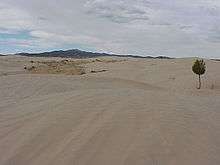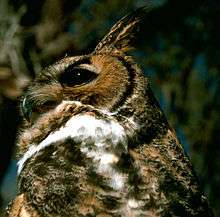Little Sahara Recreation Area
| Little Sahara Recreation Area | |
|---|---|
 | |
| Location | Juab County, Utah, USA |
| Nearest city | Eureka, Utah |
| Coordinates | 39°43′34″N 112°18′24″W / 39.72611°N 112.30667°WCoordinates: 39°43′34″N 112°18′24″W / 39.72611°N 112.30667°W |
| Area | 220 square miles (570 km2) |
| Governing body | Bureau of Land Management |
The Little Sahara Recreation Area in Utah is a large area of sand dunes, hills and sagebrush flats located in the west central part of the state approximately 30 miles (48 km) north of Delta, Utah. It is managed by the U.S. Department of the Interior Bureau of Land Management. A 9,000-acre (36 km2) portion of the northwest corner of the facility has been designated as The Rockwell Natural Area and is off limits to vehicles to preserve and shelter desert plants and animals.


Geology
The Little Sahara sand dunes are remnants of a large river delta formed by the Sevier River from about 12,500 to 20,000 years ago. The river emptied into ancient Lake Bonneville near the present day mouth of Leamington Canyon. After Lake Bonneville receded, winds transported the sand from the river delta to the current location. The dunes are still moving 5 to 9 feet (1.5 to 3 m) per year.
The sand consists of quartz grains, with minor amounts of feldspar, biotite, calcite, garnet and magnetite.
Recreation

Little Sahara is one of the most popular locations in the state for ATV riding. Riders can enjoy riding on 60,000 acres (240 km2) of sand dunes, trails and sage brush flats. Sand Mountain's 700–800 foot (210 m-245 m) wall of sand challenges experienced riders and the most capable machines. Visitors can also enjoy camping, hiking and two of the world's biggest sand boxes which are areas of the dunes fenced off from vehicle and horseback riders. Though there are many campsites excellent for tent camping, use of recreational vehicles and camp trailers is very popular. The area sees the highest number of visitors over holiday weekends from spring to fall.
Wildlife

The area is home to typical Great Basin desert wildlife including mule deer, pronghorn antelope, snakes, lizards and birds of prey. Great horned owls make their home among juniper trees in the Rockwell Natural Area.
See also
References
- "Sand Dunes at Little Sahara Recreation Area" Utah Geological Survey Web Site. Retrieved Jan. 21, 2006.
- "Little Sahara Recreation Area" Bureau of Land Management Web Site. Retrieved Jan. 21, 2006.
External links
-
 Media related to Little Sahara Recreation Area at Wikimedia Commons
Media related to Little Sahara Recreation Area at Wikimedia Commons - Little Sahara Recreation Area - Dune Guide